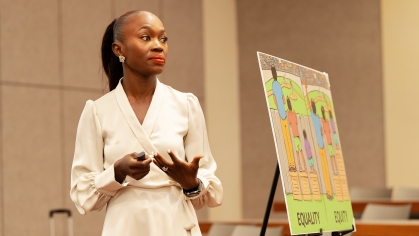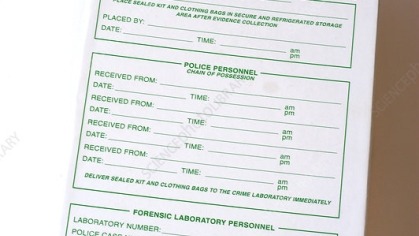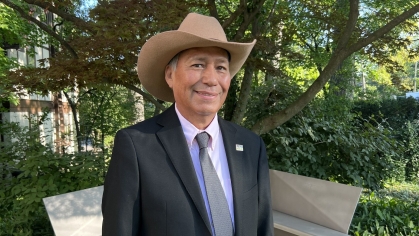Rutgers Law School faculty and students were invited by the White House to recount their efforts to halt pandemic evictions in Newark through pro bono work and an inventive outreach collaboration with community organizers and local artists.
The Stop Evicting Newark Project began in the fall as a response to the Supreme Court ruling against eviction moratoriums imposed at the start of the COVID-19 pandemic, a decision expected to result in a “tsunamii” of displaced tenants in the months ahead, said Norrinda Hayat, a law school professor and director of the Housing Justice and Tenant Solidarity Clinic in Newark and the Economic Justice and Public Benefits Clinic.
Hayat’s were one of six law school groups featured at a January 28 virtual event hosted by the White House and the Department of Justice to highlight the issue of pandemic evictions.
The Rutgers-Newark project represents tenants threatened with eviction by the Newark Housing Authority, Newark’s largest evictor, but its cornerstone is an intensive know-your-rights campaign that shares info on the law and how to apply for emergency rental assistance.
Students and faculty have created public service announcements, flooded social media, knocked on doors, and partnered with the Newark Water Coalition, a local activist group that began distributing water to city residents after lead pipe contamination was found in tap water in 2019.
Out in the community, the pro bono students wore neon green tees for visibility, branded with a logo designed by Newark artist Andrece Brady, and recruited Spanish-speaking members to reach residents in the city’s Ironbound section, where many tenants are Latinx. Hayat estimated that they reached nearly 200 people, including more than a dozen residents whose cases are being handled by clinic students.
“You look for people at every cost, you do everything you can to find them,” said Hayat. “I see that as part of the strategy. We wanted to meet people where they are instead of having people come to us.”
The anti-eviction effort was prompted by the U.S. Attorney General’s Office, which in August issued a call for law schools to begin supporting tenants before the eviction freeze was officially lifted on January 1. Hayat’s team received a $1.1 million state grant to expand pandemic eviction work at the clinic, which, along with the Economic Justice and Public Benefits Clinic, also challengies housing discrimination, helps clients who are houseless, and challenges displacement and gentrification due to the loss of affordable public and subsidized housing.
Part of the funding went toward paying grassroots groups for their efforts and giving them in-kind donations. “It’s important to work with community partners that already have legitimacy so we’re not disturbing that ecosystem but supporting it,’’ said Hayat. “And if we want to work with them, we should treat it as a real partnership that doesn’t require people of color to work for well-resourced universities for free.’’
An ongoing effort, the clinic has worked with tenants facing eviction since the first wave of COVID-19, helping them navigate an already Byzantine legal process complicated by virtual court proceedings that aren’t transparent. Many have trouble accessing hearings because they lack the technology.
"A lot of our clients are women with children, some of them are senior citizens. The stakes are high, especially if you’re elderly during a pandemic or if you have kids,’’ said student Gianna Sanguinetti, who will be recognized at the ceremony.
Student Asia Norton, a clinic fellow, and also a member of the Newark Board of Education, played a key role in the campaign, leveraging her local networks and knowledge of the city. While she wasn’t looking for validation, she’s moved that the team’s efforts are being cited by the White House as a model program. "When you work hard, you do it because you see there's a need, and you do your best to fill it. You want it done right and you want it to be received well by residents,’’ she said. “ But being recognized this way, it’s heartwarming.’’


